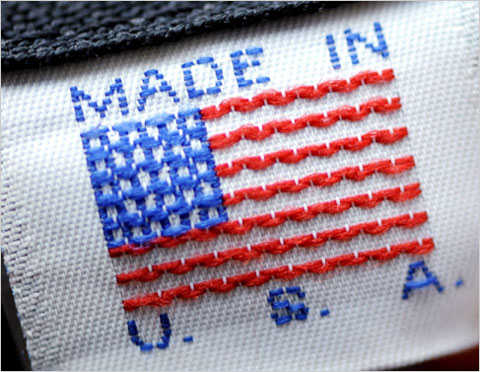 We hear it all the time: “Buy American”. Indeed, presidential candidate Rick Santorum (who semi-won the Iowa caucuses last night) just received the endorsement of the Conservative Party USA because he apparently “understands that ‘Buy American’ is the key to reviving the US economy”.
We hear it all the time: “Buy American”. Indeed, presidential candidate Rick Santorum (who semi-won the Iowa caucuses last night) just received the endorsement of the Conservative Party USA because he apparently “understands that ‘Buy American’ is the key to reviving the US economy”.
I am not going to guess as to Mr. Santorum’s motives or underlying beliefs. Just because the Conservative Party says he understands that “buying American” is the key to reviving the US economy does not mean he himself believes that to be so. But either way, the claim that buying American-made products over foreign-made products is better for the national economy is a fallacy that needs some explicating.
Many organizations (like the Conservative Party USA) advance the belief that buying American-made products help the American economy more than buying foreign-made products. They believe that by keeping American dollars “here at home”, they prevent jobs from going overseas (thus keeping unemployment low), reduce the trade-deficit, and promote the development of American manufacturing industries.
While it may seem that such a claim is true on the surface, a deeper investigation into just what happens when consumers pay more to ‘buy American’ shows that not only does doing so not help the economy, but it actually limit economic growth.
When foreign producers sell goods in the United States, it is because they are making a profit. They are supplying goods that American consumers demand at prices they agree to pay. By doing business in the US , they are inevitably in competition with American firms as well. This has the effect of incentivizing all firms to increase the quality of their good while lowering prices. This in turn benefits the American consumer, who has more goods to choose from while keeping more of their income.
The law of comparative advantage also has implications for the “buy American” debate that are particularly damning for proponents of “buy American”. If Japan, for example, is able to build and sell better cars for lower prices than American producers, allowing Japan to produce cars for American consumers frees up American capital for investment in industries where Americans have the edge (like fossil fuel production) and can find markets both at home and abroad. This in turn has the effect of increasing the division of labor, which means higher standards of living for everyone–American or not. John Stossel puts it very simply:
“Anytime we can use fewer resources and less labor to produce one thing, that leaves more for other things we can’t afford. If we save money buying abroad, we can make and buy other products.”
But doesn’t this mean our trade deficit will increase? Perhaps. But below is a good explanation from the Future of Freedom Foundation as to just why an increasing “trade-deficit” is something American consumers should not be worried about:
“The so-called trade deficit refers to the current account, which keeps track of Americans’ exchanges of goods and services with people in other countries. If in the aggregate during a given calendar year, the dollar value of the goods and services we buy from foreigners exceeds the dollar value of what we sell to them, that difference is said to be the trade deficit.
“But this is obviously a half-told story, because foreigners can do things with the dollars they earn other than buy American goods and services. They can invest in the United States by purchasing stock in companies or corporate bonds. That’s good for Americans because it helps create new products and job opportunities. Foreigners can also buy government securities. (There’s an easy way to keep foreigners from being creditors for the U.S. government, if that bothers anyone: stop deficit spending.)
“The point is that when you count everything — purchases, investments, and dollar holdings — the books must balance. It’s an accounting certainty.”
My goal here is not to deride those people or organizations that insist on “buying American.” Indeed, if buying American is one’s own preference, I encourage them to do so whole-heartedly. But it simply is not true that buying American-made products is better for the economy than buying foreign-made products.
For a more thorough exposition of the “buy local” fallacy in general, see Tyler Watt’s piece published by the Mises Institute.

Ridiculous! You act as if the ‘competition’ will just go away…the incentivizing will always be true due to the fact that people will always want choice! and THIS is the part you are OVERLOOKING. When the billion dollar corp executives, board members, etc…get their million dollar bonus.. they invest back in THEIR own economy. You act as if 1000 middle class people who saved 2000 dollars a piece and most likely shop at giant corporations like walmart, target, etc..will help our economy MORE than just ONE board member who invests into many small businesses across the US. your theory is ridiculous and WRONG.
What’s the use of buying Made in China products when they are junk and don’t last? I would rather buy something made in U.S.A that is well made and long lasting. The only one it beneficiary from foreign made products are the manufactures not the consumer. I am wearing a hat,sun glasses,shirt,pants,socks and yes even my underwear is made in china cheap quality. And not because I want to but because I have no choice!
We need Americans to Buy American in order to create more jobs and improve our economy. http://thomasbates.com/accessories-collections/made-in-usa-collection/
I like America. I think you Toyota driving sissys need to go back to Canada because if you don’t buy American they you teaching your kids to be retards. DORKS!!!!